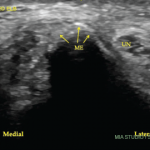The investigators also noted that patients with atypical sensory complaints are not necessarily atypical or rare. “Our suggestion is to refrain from [using such] terms as classic or non-classic CTS,” wrote Claes and colleagues in their discussion. They went on to state that patients with atypical symptoms should receive the same treatment as patients presenting with typical CTS and, thus, should be offered surgical treatment. (posted 9/19/14)
Lara C. Pullen, PhD, is a medical writer based in the Chicago area.
References
1. Stevens JC, Smith BE, Weaver AL et al. Symptoms of 100 patients with electromyographically verified carpal tunnel syndrome. Muscle Nerve. 1999:22(10):1448–1456.
2. Claes F, Kasius KM, Meulstee J, et al. Treatment outcome in carpal tunnel syndrome: Does distribution of sensory symptoms matter? J Neurol Sci. 2014:344(1-2):143–148.


